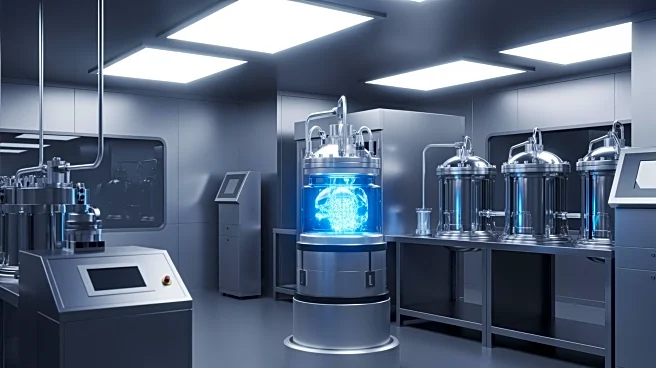What's Happening?
The pharmaceutical industry is undergoing significant transformation due to advancements in analytical techniques, automation, and biotechnology. A new eBook explores how these innovations are reshaping the development and production of therapies. Key areas of focus include spectrophotometry, micro-sampling, enzyme engineering, and mRNA vaccine research. These technologies are improving precision, efficiency, and patient outcomes in drug manufacturing. The eBook highlights the evolving role of compounded medicines, the importance of pharmacovigilance, and new developments in quality control techniques. It also discusses breakthroughs in enzyme engineering, synthetic biology, and sustainable chemistry approaches that recycle plastic into paracetamol.
Why It's Important?
These innovations are crucial for meeting the growing demand for safer, more precise, and sustainable medicines. By enhancing the efficiency and accuracy of drug development processes, the pharmaceutical industry can produce therapies that are more effective and have fewer side effects. The focus on sustainability is particularly important as it addresses environmental concerns associated with pharmaceutical production. Additionally, advancements in mRNA vaccine research are vital for rapid response to emerging health threats, as demonstrated during the COVID-19 pandemic. Overall, these developments are driving smarter, faster, and more sustainable drug development, benefiting both the industry and patients.
What's Next?
The pharmaceutical industry is expected to continue embracing these technological advancements, leading to further improvements in drug development and production. Future trends may include increased automation in manufacturing processes and the integration of artificial intelligence to optimize workflows. The industry will likely focus on expanding the use of personalized medicine, leveraging compounded medicines and pharmacovigilance to ensure global drug safety. As sustainability becomes a priority, more companies may adopt green chemistry practices, reducing the environmental impact of pharmaceutical production.
Beyond the Headlines
The shift towards more sustainable and precise pharmaceutical manufacturing has broader implications for public health and environmental policy. As the industry adopts greener practices, it may influence regulatory standards and encourage other sectors to follow suit. The focus on personalized medicine could lead to ethical discussions about access to tailored therapies and the potential for disparities in healthcare. Long-term, these innovations could redefine the pharmaceutical landscape, making it more responsive to societal needs and environmental challenges.














